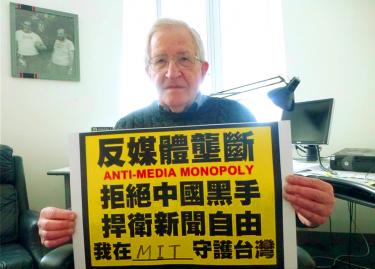Famed US linguist and activist Noam Chomsky lent support to Taiwan’s anti-media monopolization movement in a photograph shared on social networking site Facebook late on Saturday.
Chomsky, an 84-year-old linguistics professor at the Massachusetts Institute of Technology (MIT), was seen posing for a picture believed to be taken by a Taiwanese student abroad, while holding a poster that read: “Anti-Media Monopoly. Say no to China’s black hands, defend press freedom. I am safeguarding Taiwan here in MIT.”
The photograph was posted on Facebook at about 8pm on Saturday by a female netizen who identified herself as Lao Tzu-hung (劉子鳳), and had been shared about 4,000 times as of press time yesterday.
Citing a famous quote by Chomsky, Lao said: “Propaganda is to a democracy what the bludgeon is to a totalitarian state.”
“When the media unanimously creates empty slogans such as ‘harmony’ or ‘stabilizing society’ and leave behind the real problems society should be facing, the public could easily lose their willingness and capability to think,” Lao quoted Chomsky as saying.
They could end up being the “onlookers” in democratic societies and fall for the delusion that “everything will be better tomorrow,” Lao quoted the celebrated linguist as saying.
Citing another quote by Chomsky to warn against the dangers of media concentration, Lao said that as long as people are marginalized and distracted they have no way to organize or articulate their sentiments, and they simply assume that they are the only people with what are seen as crazy ideas.
In the end, “you just stay on the side and don’t pay any attention to what’s going on. You look at something else, like the Superbowl,” Lao cited Chomsky as saying.
The photograph of Chomsky has prompted a fervent response among netizens, with some expressing gratitude to the famed scholar’s support for the country’s anti-media monopolization efforts.
An unidentified netizen said: “If a US scholar is aware of the dangers of media concentration [in Taiwan], the people of this country must not stay silent anymore.”
Dubbed as “the conscience of America,” Chomsky has strived to bring to light atrocities committed by the US government since the 1960s, including its support of the Indonesian regime’s brutal suppression of East Timor between 1975 and 1999.
Chomsky also emerged as a renowned public advocate for press freedom in the US and worldwide, mainly because of his vehement opposition to the notion of governments or giant corporations holding control over social media in which the public is manipulated.
Chomsky first visited Taiwan in August 2010, when he delivered speeches in Academia Sinica in Taipei and National Tsing Hua University in Hsinchu City.
A number of public figures in Taiwan have recently also expressed their opposition to media monopolization, including Wu Ching-feng (吳青峰), the lead singer of the popular band Sodagreen (蘇打綠).
Wu said during his New Year’s Eve performance in Greater Kaohsiung on Monday that the media should be an open platform through which the truth is conveyed, rather than something that attempts to monopolize the market or manipulate the public.
Source: Taipei Times - 2013/01/07





















